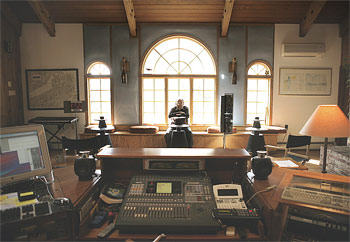Learning What's Involved In Critical Listening

Recently I gave a guest lecture at the New England Institute of Art in Boston on the subject of Critical Listening. And while this is a fairly standard topic for me, in the past year I've had a number of insights about it that make it, well, a little more interesting. I thought I'd share some of those thoughts with you.
Critical Listening is, as you probably know, the act of listening carefully to the quality of your audio to assess it for (a) technical quality, (b) programmatic quality and (c) aesthetic or style quality. Or, Critical Listening is the listening you do to other people's audio for which you get paid.
Your goal is to (a) make them sound better than they did when you started and (b) make them sound really good, in every case! Those outcomes are what enable you to get paid!
THE IZOTOPE STORY
Back story: I have a really nice post-production room, fitted with very good loudspeakers (Bang & Olufsen's BeoLab 5s and 3s, which I helped create), in surround and stereo, located out in the woods maybe 30 miles from Boston.
The room was carefully designed and built when I first did this in 1993, and I've managed to effectively maintain the room and upgrade it over the years. (See the Starting Over series on my website, if you're curious. Check out the second installment especially.) I've also come to take the room, and the loudspeakers in it, for granted.
I've been telling students for some time now that, "Well, yeah, this is a really nice room and I'm spoiled. But it doesn't really matter. You just learn your room and your speakers; learn to work around their problems and you'll be fine. You don't have to spend $100 grand-plus to do this work really well. I was just lucky to get this space and these speakers."
Nice, encouraging, modest. What's not to like?

Dave's audio lair So anyway, last spring a software company in Cambridge, iZotope, hired me to teach all their employees about audio. I included Critical Listening and Audio Ear Training in the curriculum, and every week I trekked in to Kendall Square and taught them in their conference room, working with a pair of powered Mackie monitors in a room with some brick walls, a dropped ceiling, a conference table, some windows and some industrial-strength HVAC.
Usually, when I teach this stuff, I am too busy keying on the students to listen carefully myself. I'm there for them, and I already know what it sounds like, right?
The last class of the course, on the other hand, I held on a Saturday at my studio, where I could show them a little more about mastering and the fine points of stereo, plus a consideration of surround sound.
After we finished up, we gathered around the pool for some adult sustenance, as geeks like us will do. As the sustenance began to take hold, the students began to share with me some interesting observations, which mostly were admissions that they had generally been unable to hear in their conference room most of the audio things I had been talking about (things like phantom images, polarity reversal, changes in bottom end, stereo vs. mono, etc.) and had been growing more than a little worried about it. But when they got to my room, lo and behold, all that stuff was absolutely, gloriously clear, and everything I had been talking about was almost stupidly obvious.
There's a lesson there, and I'm sorry to say that I had forgotten it, just because I haven't had to face it in years. That lesson is: you need good speakers, placed well in a good room, in order to Listen Critically. Amen!
I'll spend some time in a few upcoming columns discussing the details of this, but for now, let's touch some high points.
A GOOD ROOM IS HARD TO FIND
I've identified seven principles that we all need to address in creating a good Critical Listening room. Two of them have to do with loudspeakers. The other five are:
- • Get the noise floor down to a viable level, so you can hear the low levels in your audio.
- • Establish lateral room symmetry to help you hear stereo and envelopment.
- • Nurture good early reflections (from the side walls) and suppress bad early reflections (from the ceiling and floor), to help you hear timbre, stereo and envelopment.
- • Control the decay time in the room to help you hear reverberance and transient details in your audio.
- • Control and reduce standing waves to help stabilize low-frequency response and room behavior.
We'll drill down into the details of how to do these things, inexpensively, next column. The point is, if you don't take care of them, you are crippling your ability to reliably produce good audio.
AND GOOD SPEAKERS? WHERE?
We can actually define the values needed for good loudspeakers to use in production. Again, I'll put off the actual numbers for a future column, but I can say right now that the loudspeakers we use to monitor must have:
- • Good bandwidth
- • Adequate power
- • Good dispersion
- • Good consistency speaker-to-speaker
And then we get to the problem of where to place them. Interestingly, some groundbreaking research by Dr. Floyd Toole (formerly of Harman International) shows quite conclusively that the placement of speakers in your room has an even bigger effect on the perceived quality of your speakers than do the four items above. Placement is critical!
WHAT DOES IT ALL MEAN?
There is a myth that we need to listen on bad speakers (like Auratones) so that we can hear our audio the way our end-users do. That myth bears some serious discussion in yet another future column.
However, what is also clear is that if you listen as your end-users do, you are going to miss a great deal of what's going on in your audio, just as they do. In order to pick out all the goodnesses and badnesses in the audio, you need to listen to good speakers placed well in a good room. Only then can you start polishing that audio and making it better.
Next column, I'll talk in some detail about how to create a viable Critical Listening room. Relax, it's not going to cost that much.
Thanks for listening.
Dave Moulton has just reinvented stereo, but now it sounds REALLY good. You can complain to him about this or anything else, at his websitewww.moultonlabs.com.
Get the TV Tech Newsletter
The professional video industry's #1 source for news, trends and product and tech information. Sign up below.

